Introducing XTERRA’s Ben Allen
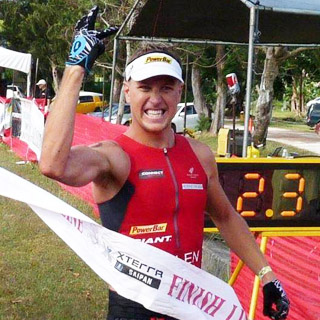
You might call him a Renaissance man of multisport, as Ben Allen has had successful careers in Australian surf lifesaving, open water swimming, adventure racing and had a good start in ITU Olympic-style racing. But recently the 27-year-old from Wollongong, one hour south of Sydney, Australia, has found a home in XTERRA – which he claims requires a nice combination of all his previous skills. This month Allen emerged in the off road triathlon limelight by winning the inaugural XTERRA Asian Triple Crown with victories at Guam, the Philippines and Saipan. By outracing triathlon veteran Olivier Marceau in all the races, Allen sent a message that he will be a contender when all of XTERRA’s heavy hitters contend for glory at Ogden and Maui.
Allen was interviewd by telephone just before his Triple Crown winning victory at Saipan.
Slowtwitch: What sports did you do growing up in Australia?
Ben Allen: I did surf lifesaving since the age of 9 until I was 20. SLSA (Surf Life Saving Australia) involves an ocean swimming, ski & board paddling, surf ironman and team events. I’ve grown up on the beach and I think I’ve competed at every beach in Australia’s east and west coasts. I spent most of my time traveling to & from beaches with my mum Janelle, my dad Dennis and my younger sister Candice.
ST: How well did you do in surf lifesaving?
Ben: I won numerous state, Australian and world championship medals in my time. I was able to represent Australia at the world championships where we won team titles. I also was fortunate enough to win a few medals in open water surf swimming, the Ironman and surf lifesaving team events as well.
ST: Was there some prize money in that sport?
Ben: They had a professional Ironman series, but not enough funding to make a living. Most Surf pros had part time jobs, working at local surf clubs or as beach lifeguards. You pretty much do it for the love of it and the experience of traveling up and down Australia’s beautiful coasts to compete against the fittest surf athletes. This was my motivation and I really enjoyed my time in the sport.
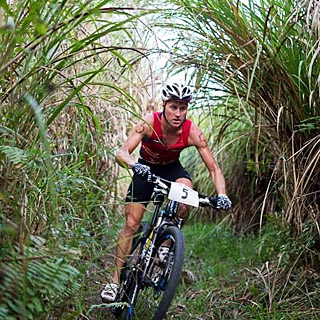
ST: After hanging it up at age 20, what did you do?
Ben: Fortunately, I got a call from Triathlon Australia at the peak of my surf lifesaving career to come across and try out in triathlon as an elite athlete. I was targeted by the Australian Talent Identification program who were looking for potential World Class Olympic and World Championship medalists in the sport of triathlon. I enjoyed racing in the ITU circuit, which was from 2005 to 2007.
ST: What were your best results in ITU racing?
Ben: I was 4th at a Singapore Continental Cup, I got 7th in Mombasa Kenya at the African Continental Cup and I raced the Ishigaki World Cup but didn’t place well. It is pretty hard to get a start in ITU racing, especially since Australian athletes are very strong. My first couple of years it was all about getting experience and getting a feel for the sport.
ST: Why did it suit you? And why did you leave it?
Ben: I enjoyed the ITU racing and style of racing. But ultimately that wasn't really my only interest in the sport of triathlon. My primary interest in ITU racing was to qualify for and go to the Olympics. But being a young athlete coming into the sport and thrown into deep end, I needed time to gain experience. With Olympics coming and going fast, they tried to speed up my development. I was good enough to make several starts but I knew I needed a lot more years of development to get to elite level racing.
ST: So did you change course?
Ben: I took a step back and said to myself I needed to get a few more triathlon seasons under my belt and a lot more training with a long term goals of going to Rio de Janeiro. But right at the moment, with Beijing and London out of the picture, I decided to do some adventure racing for a year and competed in the Australian adventure race series. I won the series individual title which was great fun and I was able to race all over Australia and achieved selection in the adventure racing world champs in Ireland where I raced with Team Australia and we finished 7th.
ST: Who are some of your favorite adventure racers?
Ben: Richard Ussher won big adventure races and has been outstanding in Ironman races, he also competes in some XTERRA as well. Definitely he’s my idol with adventure racing and I am very excited to have the opportunity to race against him.
ST: How did you do when you competed with Ussher?
Ben: Going head to head in individual adventure racing, it seemed like he wins one and I win another. It is quite an experience racing him as he is one of the best athletes in the world.
ST: Do adventure racing qualities carry over to other forms of triathlon?
Ben: Yes — the mental aspect of the sport. With adventure racing, a lot of the racing is about bouncing back from unlucky situations that arise whilst racing. When you come across an unlucky situations – a flat tire, or a bad judgment, you must be able to overcome that obstacle and draw on your mental strength to stay positive and focus on your objective. I have some unique skills from both surf lifesaving and adventure racing that have helped me in XTERRA.
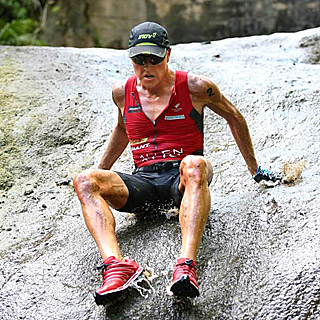
ST: What finally led you to XTERRA?
Ben: I started doing mountain biking long ago as cross fitness for surf lifesaving and I always loved to ride my mountain bike, swim in the ocean and do trail runs. So in 2010, I did my first XTERRA race in NZ and I loved it. I wanted to stay in the sport of triathlon, but wanted to add a bit more adventure than simply swim and bike and run on pavement. I liked the technical challenges on off road trails and single track and I found XTERRA suited me as it used all my skills I’d developed in surf lifesaving and ITU triathlon racing. I felt I could not pass up the chance and started to seriously race XTERRA last year. In which I did 13 World Xterra Tour Races around the Globe..
ST: What were some of the things you encountered in XTERRA that reminded you of adventure racing?
Ben: Last year in my first year of XTERRA, I did a race in Brazil in the Amazon jungle. That was a unique experience – swimming with piranhas, and running through the Amazon jungle with anacondas and some of the deadliest spiders in the World was an awesome experience. Brazil was my first XTERRA World Tour title and I was so glad I made the trip to go and race.
ST: What did it feel like to win?
Ben: It was absolutely amazing. I put a lot of work and effort in my preparation for this event and to finally get a win at an XTERRA World Tour race was a great feeling of relief and a weight off my shoulders – especially in Brazil.
ST: How old are you? And how old do you feel after all these adventures?
Ben: I am 27. It’s exciting that there is so much behind me — and so much ahead. Trey [Garman Vice President of XTERRA] says I am one of the new generation of XTERRA athletes. XTERRA has had great athletes like Conrad Stoltz and Dan Hugo — guys who have been around a while and i have much respect for. I have a very strong swim background and a good bike and run to go with it. Not often do you see someone with a strong swim, strong bike and strong run – and I feel that i have a good balance of all three disciplines.
ST: On a very good day, what times would you hit for a pavement Olympic distance triathlon?
Ben: For a 1.5 k swim, roughly around 16:30 to 17 minutes. For a 40k bike, about an hour. And for a 10k run, around 32 minutes.
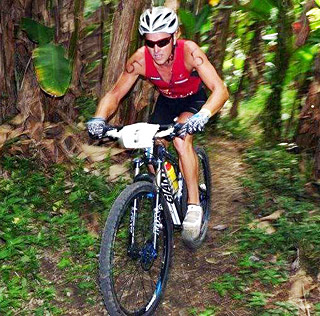
ST: For those who may think that XTERRA is a just a niche sport, can you describe the quality of competitors?
Ben: Look at the XTERRA world championship field in Maui. Lance Armstrong, 7x Tour de France winner. Jan Frodeno, 2008 Olympic champion. Ivan Rana, 2002 ITU World Champion. Conrad Stoltz, two time Olympian and 4x XTERRA World Champion. Olivier Marceau, 2000 ITU Olympic distance World Champion. Eneko Llanos, Olympian, 3x XTERRA World Champion 2x ITU long course World Champion, multiple Ironman winner. Some people say XTERRA is not a world class event? Seems that many world class athletes want to be a part of XTERRA because it is a unique experience with a great atmosphere. It is getting bigger and welcomes all new athletes to experience it. And once you do XTERRA, you’re hooked for life.
ST: What do athletes from other forms of triathlon need to handle XTERRA?
Ben: I think with XTERRA you need to expect the unexpected. Most races there are many factors that you encounter through the race. There are obstacles you never come across anyplace else – animals that can eat and kill you or put you in the hospital for a few days. And there are different styles of terrain you need to negotiate– rocky, steep descents, heart pumping climbs. You run down and climb up water falls. You run through spider-infested forests. You get scratches from head to toe. But that is why a certain breed of athlete thrives for XTERRA and draws inspiration and motivation from the challenge.
ST: What part do the organizers play in XTERRA’s popularity?
Ben: Team Unlimited puts on wonderful races all around the world. They are respectful of and preserve the natural environment and make sure no one litters the course. At every race they go back and make sure no there was no damage and repair damage if need be. XTERRA always put athletes first and all of the decisions they make are in the best interest of the athletes. When any situation arises, they are very safety conscious and do not send athletes out into dangerous situations.
ST: Except for the poisonous snakes, deadly spiders, etc. Everybody knows about those going in.
Ben: Well of course. And Team Unlimited are very friendly, approachable and provide such a great atmosphere which makes XTERRA the cool side of triathlon. Everyone feels like they are part of a very neat, small community. The beauty being part of the sport of XTERRA is you know all other competitors have your back so you are free to enjoy racing for what it is.
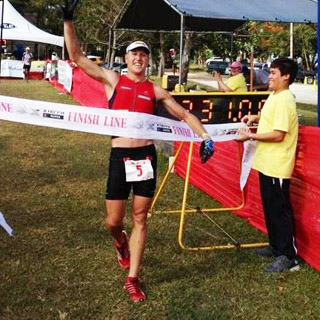
ST: Your winning battles at Guam and the Philippines have left you the opportunity to win XTERRA’s first Asian Triple Crown — if you can win at Saipan. What were those races like?
Ben: Guam kicked off the season for all pro XTERRA athletes. It was a bit like going into the unknown, not knowing how fit you are after the Australian summer and the northern hemisphere winter. It’s the first race of the season and for me it was a great event – an ocean swim, perfect conditions for an Aussie guy who grew up swimming in the ocean. I was pretty strong and I led the swim and had 1:30 on Branden Rakita at T1. I rode very well and I was very strong but the last little climb I got a flat tire and had to ride the last 3-4 k with a flat on the front wheel so Olivier Marceau caught me.
I had to remain focused and determined not to let that flat get the better of me so I could chase him down on the run. He had a minute on me at the start of the run. I really wanted to win and was prepared to work hard.
ST: How well were you prepared?
Ben: My coach is Guy Hemmerlin of France. He worked me hard through my summer in Australia to prepare me for the XTERRA Asian Triple Crown. He had me build a very, very good base which could carry me through the Asian, European and USA seasons.
ST: What was your strategy chasing Olivier on the run in Guam?
Ben: Pretty much head down, bum up, run hard as I could. The first 3 or 4 kilometers were on the flat, then we came to a big hill leading to a waterfall and dropping through a jungle near the end. I thought if I could make up a minute in the first part of the run, I could pass him on the climb and hold position and the lead going into the last section of the waterfall and downhill and run through the creek to the finish. I took a lot of risks in that section to increase my advantage over Olivier and ran strong all the way home.
ST: What happened in the Philippines?
Ben: I had a strong start in the water and came out 3rd with an age grouper and another pro – Matthieu O’Halloran of Canada — who is a strong swimmer. I thought if I can get away on the start I’d be able to ride strong on this very difficult two-lap mountain bike course. I had a minute on Olivier Marceau but I had to stop halfway through the bike and had to change a flat and my lead decreased to 29 seconds. I used that to draw motivation and when I finished the second lap of bike I had increased my lead to 3 minutes. To be able to ride away from high class athlete like that was exhilarating. I have so much respect for Olivier — he’s done so much in triathlon I’d be stoked and a happy man if I could do half as much in my career. The Philippines course suited me — rocky, technical, lots of changes of elevation and I was able to ride well and come off bike with a 3 minute lead.
ST: What did the race feel like?
Ben: There were so many supporters lining the run and bike it was like the Tour de France. There were many schoolchildren out on the run who’d your name it gave you a big charge.
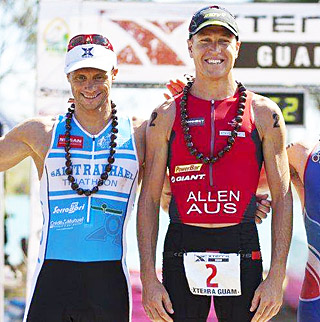
ST: Right now you are the top gun in the Asian part of the World Tour and last year who won a tough race in Brazil. But Maui was another story.
Ben: Last year was my first year in XTERRA and my first year racing Maui. I did not have many high expectations going in there. I waned to get familiar with the course, get to know how to race there. I heard so many stories that this was a whole other level of course and racing. I wanted to put in a good performance and come away with an idea how to race there> I did not want to race gung ho. I wanted to develop my performance and build for long term.
ST: What was your impression of the bike course?
Ben: Super, super hard. It had 3500 feet of elevation climbing. You really needed to be good climber and have the ability to climb with heart rate beyond your normal limits and still be able to focus on the descents. I started well but I made a few schoolboy errors. The heat took it out of my legs and cost me 10-12 minutes coming off the bike. I was also a bit unlucky. I had a very good swim and was in the front group with Ivan Rana and Richard Stannard, and Lance. When I jumped on the bike I had a very good first half. The second half I suffered a bit and faded to the end and finished well back [36th].
ST: Did you take away anything positive?
Ben: I gained a lot of experience and race knowledge and I believe now I know how to race there. I got to know the course profile and I will go back with a lot more confidence and history of race planning and strategy.
ST: So how do you feel after taking Saipan?
Ben: Very happy to Win all three and become the Xterra Triple Crown Champion!


Start the discussion at slowtwitch.northend.network